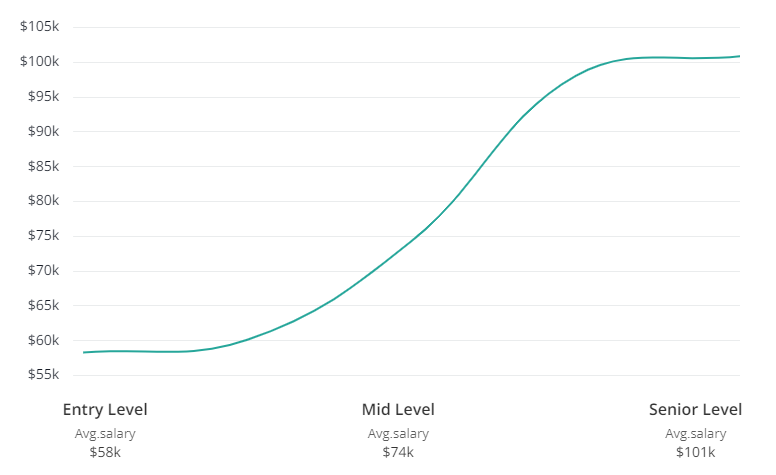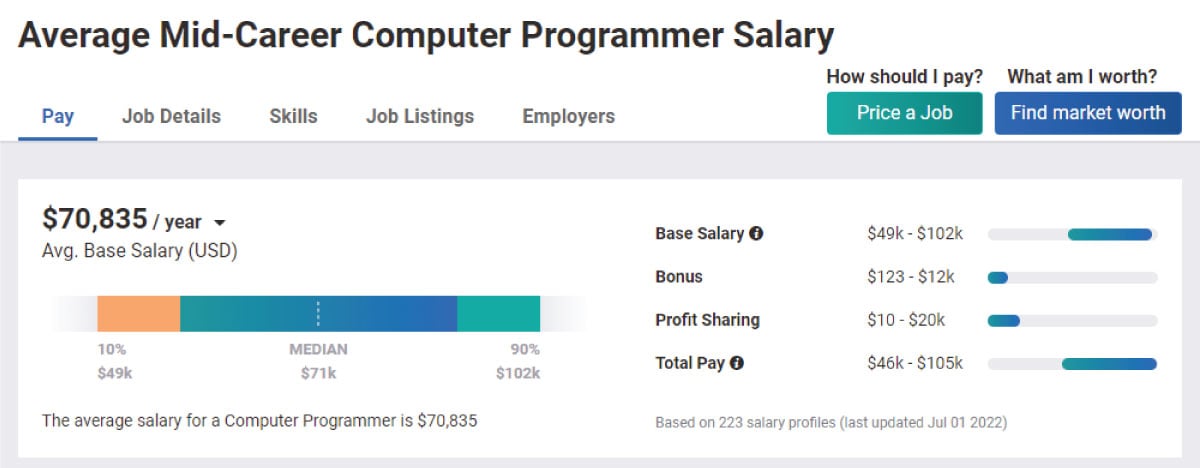Businesses of all sizes need programmers now more than ever, and the demand for their services is at an all-time high. It’s not just the Fortune 500 companies that need these professionals, though—medium-sized and small businesses worldwide need programmers to create software and web applications that are integral to running their companies.
If you’re thinking about becoming a programmer and want to know what your salary might look like once you complete your training, this post is for you! We’ll be going over everything from the average programmer salary for different levels of experience to how much money you can make if you decide to move into more professional programming roles later in your career. Read on!
What Is the Average Salary of a Computer Programmer?
According to Payscale, the average salary of a computer programmer is $66,293 per year, but it can vary based on how long you’ve been working in the field and your experience level. Programmers earn up to $12,000 in bonuses and $20,000 in profit sharing. In addition, they can receive additional income by working overtime.

They can also receive stock options and employee stock purchase plans (ESPPs), which are essentially discounted shares of the company that employees can purchase at a discount.
Programmer Salary by Levels
The average computer programmer’s salary varies based on their experience level.

Entry-Level Programmer Salary
Entry-level developers with up to two years of experience can earn an average starting salary of $59,941.
That’s about $21 per hour for 40 hours per week. This is an excellent place to start if you want to break into the field and make some money while gaining valuable experience.

Related Read: 9 Entry-Level Programmer Jobs To Pursue This Year
Intermediate-Level Programmer Salary
After three years of experience, programmers can expect to earn an average of $70,835 per year—about $27 per hour for 40 hours per week.
At this level, you’re probably ready to start managing other people or projects on your own.

Senior-Level Programmer Salary
After five years of experience and significant growth within a company or industry, programmers can expect to earn between $90,597 annually—around $38.77 per hour for 40 hours per week.

Senior programmers have more responsibility than junior ones but also bring more value to their employer because they’ve gained more skills over time.

Programmer Salaries by Industry
Programmer salaries vary widely by industry. While some industries are more lucrative, you can find great programming jobs in various places.
Tech
Programmers in the tech industry are some of the highest-paid workers in the country and earn an average of $89,063 annually or $42.82 per hour.

For example, intermediate-level tech programmers working at HP earn $104,200 per year, while those working at LinkedIn earn an average of $159,600 per year.

Finance
The average annual salary of a financial programmer in the United States is $67,090. This will vary depending on the firm they work for and their experience level. Experienced financial programmers can earn up to $103,586 per year.

Retail
Entry-level programmers working in the retail sector make an average of $72K a year, while senior-level programmers earn an average of $105,000 annually.

Healthcare
Due to their high demand, programmers can make a comfortable salary while working in the healthcare industry. According to Zippia, programmers in healthcare make an average salary of $102,530.

Government
The job requirements of a computer programmer at the federal level are to develop, create and implement software based on government needs or objectives. The average salary for a Federal Government computer programmer is $122,729 per year, including bonuses.

Programmer Salaries by Education
In a world where the demand for experienced programmers is at an all-time high, it’s essential to know what the market offers—not just for those who already have a degree.

Here are the average programmer’s salaries by education level.
No Degree
If you have what it takes to succeed in the programming world, you can land a job as a programmer without a degree as long as you’re willing to work hard and can prove your skill.
Research shows that programmers without a degree earn an average salary of $53,216 annually.
Diploma
A 2016 report from Stack Overflow found that a considerable percentage of software developers had either no degree or only a diploma.

The average salary for programmers with a college diploma is $67,221 per year, while for those with a coding bootcamp, it’s $74,482.
Bachelors
Although there are many paths for people with a bachelor’s degree in computer science, the average starting salary of someone with this degree is around $82,173 per year.
This figure varies depending on where you live and what type of employment you’re pursuing.
It’s also important to note that those with some coding experience before entering the field can expect to make more money than the average college graduate.
Masters
While it’s no surprise that those with advanced degrees in any field earn more than their counterparts, the specific numbers, in this case, are hugely revealing how much value an extra degree can add to a programmer’s salary.
For one, the median annual income for programmers with a Master’s degree ($86,949) is over $4,000 more per year than programmers with just a Bachelor’s degree ($82,173).
Get To Know Other Software Engineering Students
Bryce Dunn
Associate Software Engineer at Egen
Rafael Alvarado
IT Support Engineer at Amazon
Kristy Chu
Software Engineer at FloQast
Jobs That Command the Best Programmer Salaries
There are many different programming jobs that you can consider, and each of them offers different career paths. However, they all require different skills, have different pay rates, and may even be a better fit for your personality. Let’s have a look at some of the most common ones!
Systems Analyst

What They Do
Systems analysts bridge the gap between an organization’s business and technical sides. They take information from the business side and turn it into workable solutions. These critical software solutions include software applications, mobile apps, and interactive multimedia presentations.
Systems analysts also work with the technical side, communicating their vision of a technical solution to software systems engineers and developers so they can build a product that meets the requirements of both sides. This can range from working on a project’s software design documentation to writing portions of code and ensuring the software is secure.
Salary Range
Systems analysts earn an average base salary of $68,083 per year.

Software Engineer

What They Do
Software engineers create the apps and computer programs that we use every day. They define how a program works, including how it’s structured, receives data, processes information, and then displays the results. They also build systems that help businesses run more efficiently.
Salary Range
The national average salary for software engineers is $117,242 a year.

Full-Stack Developer

What They Do
Those with professional full-stack development experience can build and manage the software. They take an initial idea, design the product, and then create it according to their original vision.
This includes everything from front-end development (creating graphics, coding interactive pages, etc.) to back-end work (creating databases and algorithms).
Salary Range
A full-stack developer earns an average salary of $100,613 annually.

Systems Administrator
What They Do
System administrators are responsible for the smooth operation of a company or organization’s computer systems, networks, and other components.
Job responsibilities include ensuring that computers and networks are running correctly, installing new software and hardware where necessary, and resolving issues when things go wrong.
Salary Range
Systems administrators make an average of $63,934 per year.

Data Scientist

What They Do
Data scientists use their problem-solving skills and analytical prowess to collect new types of information and find new ways to interact with existing information. This might involve building new tools to simplify the collection process or applying new statistical models or machine learning techniques to pre-existing data sets.
Other data scientists use their creativity to find ways their organization can use data. For example, they draw connections between bits of information and develop methods for customers to engage with their products.
Salary Range
Data scientists earn an average of $119,906 per year.

Cloud Architect
What They Do
A cloud architect is a software engineer who designs cloud computing systems and oversees the deployment of those systems. They work with many technologies, including virtualization platforms, operating systems, distributed systems, and databases.
The position is cross-functional, and the cloud architect communicates with development partners, the project team, operations staff, and software engineers to ensure their needs are considered.
Salary Range
A cloud architect earns an average salary of $133,642 per year.

Related Read: How Do You Become a Cloud Engineer?
Factors Affecting Programmer Salaries
There are a lot of different factors that can affect your salary as a web developer, and they all influence how much you get paid. Let’s take a look at some of the main ones.
Educational Background
Your education can significantly affect your salary, especially if you have a master’s degree or Ph.D. Companies tend to value people with postgraduate education more than those who don’t have it, so having an advanced degree is worth more than just the time and effort you put into getting it.
Experience
It doesn’t matter how much you know about programming if you’re new to the field; experience is what helps you get the job done. The more programming experience you have, the better you’ll be able to handle increasingly complex tasks, making you more valuable to companies.
Skills

Employers also consider your skill level when deciding how much to pay you. You’ll likely earn more if you know at least one modern programming language and have various specialties, such as back-end or front-end development. Keep learning and growing your programming expertise by using resources like Stack Overflow or taking a programming certificate.
Location
In most cases, companies will compensate their employees based on where they live. It’s no secret that the average software engineer in Silicon Valley can command a much higher salary than a counterpart in rural West Virginia.
Organization
Your salary may vary depending on whether you work with a large corporation, a small business, or even an independent entrepreneur. Also, consider whether the organization is established or still growing; this will significantly impact the number of employees and, consequently, the average salary in your company. For example, if you work for a big, well-known company like Google or Apple, you will likely receive a higher salary than if you worked for a smaller company.
How Can You Earn More as a Computer Programmer?
While the average salary for a computer programmer is about $70,835 per year, it’s not unusual for someone in the field to earn much more. If you have your sights set on attaining that top-tier salary, there are several things you can do to increase your earning potential.

You can start by taking courses that will hone your skills and help you land a higher-paying job. Software engineering bootcamps are particularly helpful if you’re interested in web development.
These courses will also make it easier for you to find employment as a software engineer or programmer at a company that does web development work.
Another course worth taking focuses on programming languages or coding standards within the industry where you’d like to work. This will make it easier for you to learn programming when you start your new job.
If you want a salary increase as a computer programmer, consider earning a bachelor’s degree in computer science or another related field along with your certification. These degrees are generally considered more valuable than certifications alone.
Programmer Salary FAQs
We’ve got the answers to your most frequently asked questions.
What Is the Average Starting Salary for a Programmer?
The average starting salary for a programmer is around $59,941, which is higher than in many other industries. The average programmer can expect to make more than that in their first year, and with experience and education, they can earn even more.
How Much Can You Earn per Hour as a Programmer?
The average hourly wage for a computer programmer is $24.44. This can vary depending on the location and type of work, but it’s a good general guideline.
Can You Make Six Figures as a Programmer?
It’s entirely possible to make over six figures as a programmer. You don’t need to be a brilliant programmer to make six figures. You just need to know how to market yourself properly and negotiate your salary effectively. You may think that programming is all about writing code from scratch, but there are plenty of other ways that you can make money as a programmer. For example, you could easily become an online consultant or programming freelancer if you have a sales background.
Can You Save Money as a Programmer?
Yes. Web programming is an open field. There are plenty of opportunities for programmers willing to take on small projects and work from home, so even if your main job doesn’t pay well yet, it might be possible for you to make ends meet by doing freelance work on the side.
Since you’re here…
Interested in a career in software engineering? Join our mentor-led Software Engineering Bootcamp or our foundational Software Engineering Course if you’re just starting out. We help people make the switch every day (just peep our reviews). You can do it, too!






